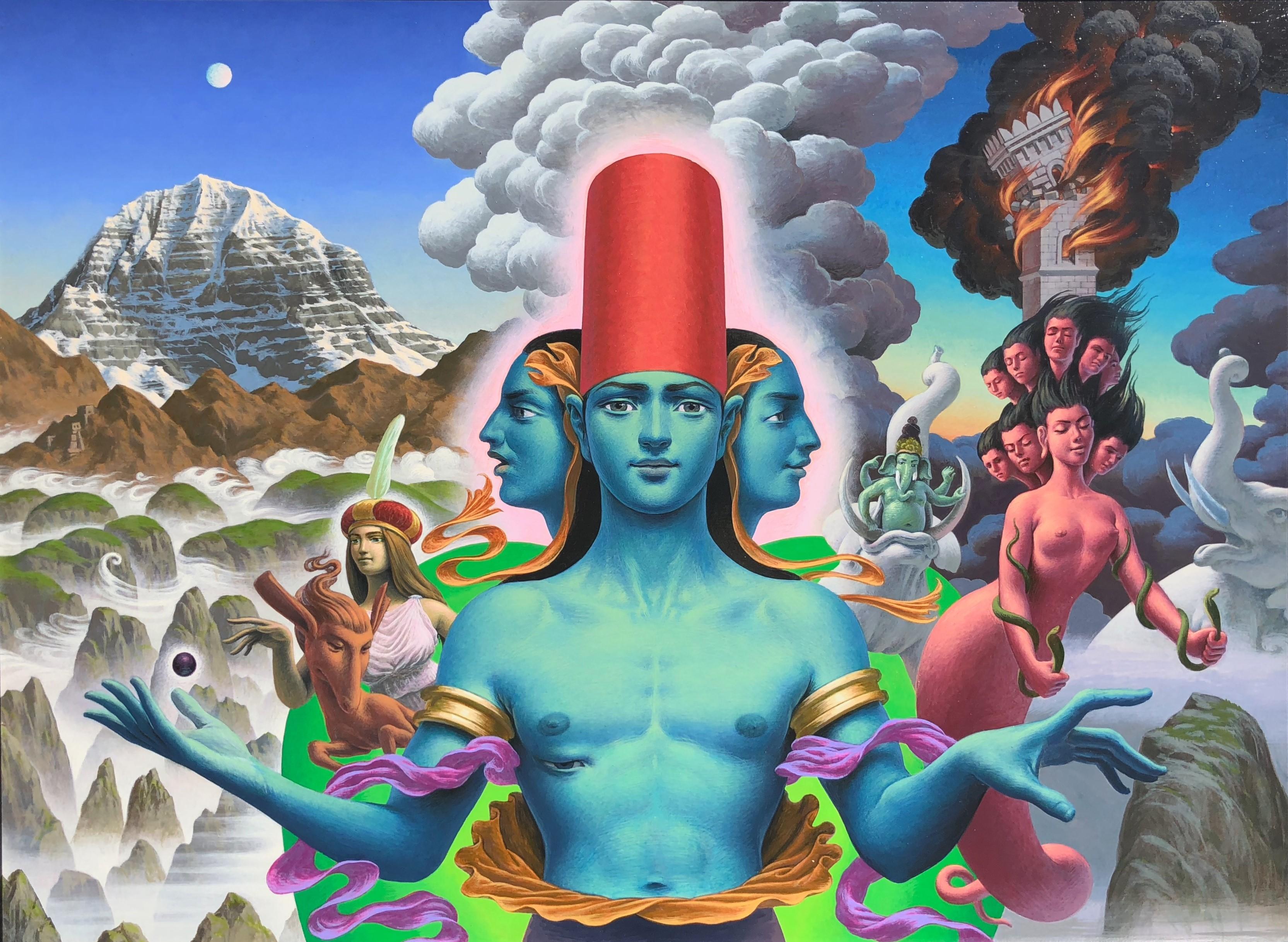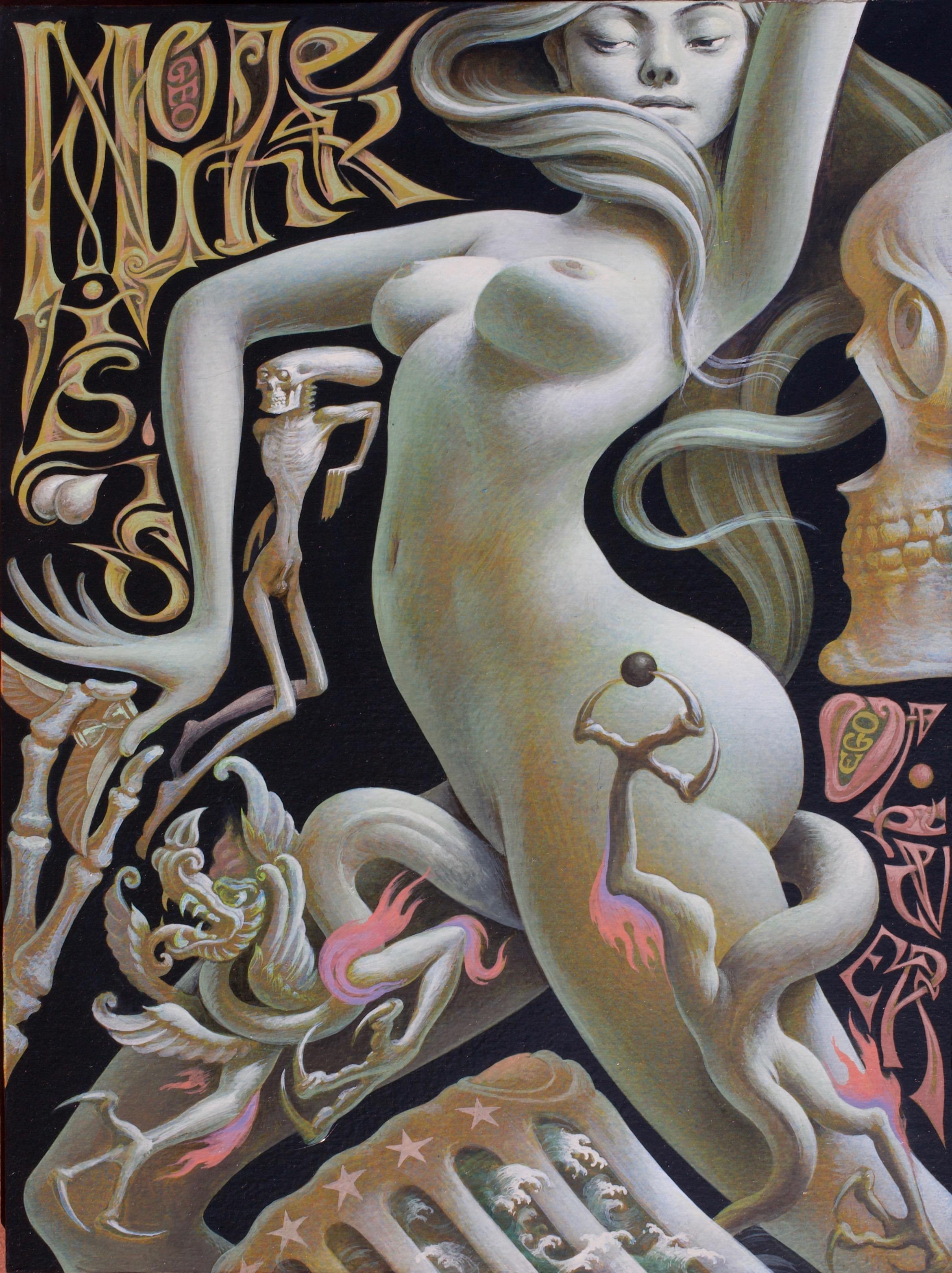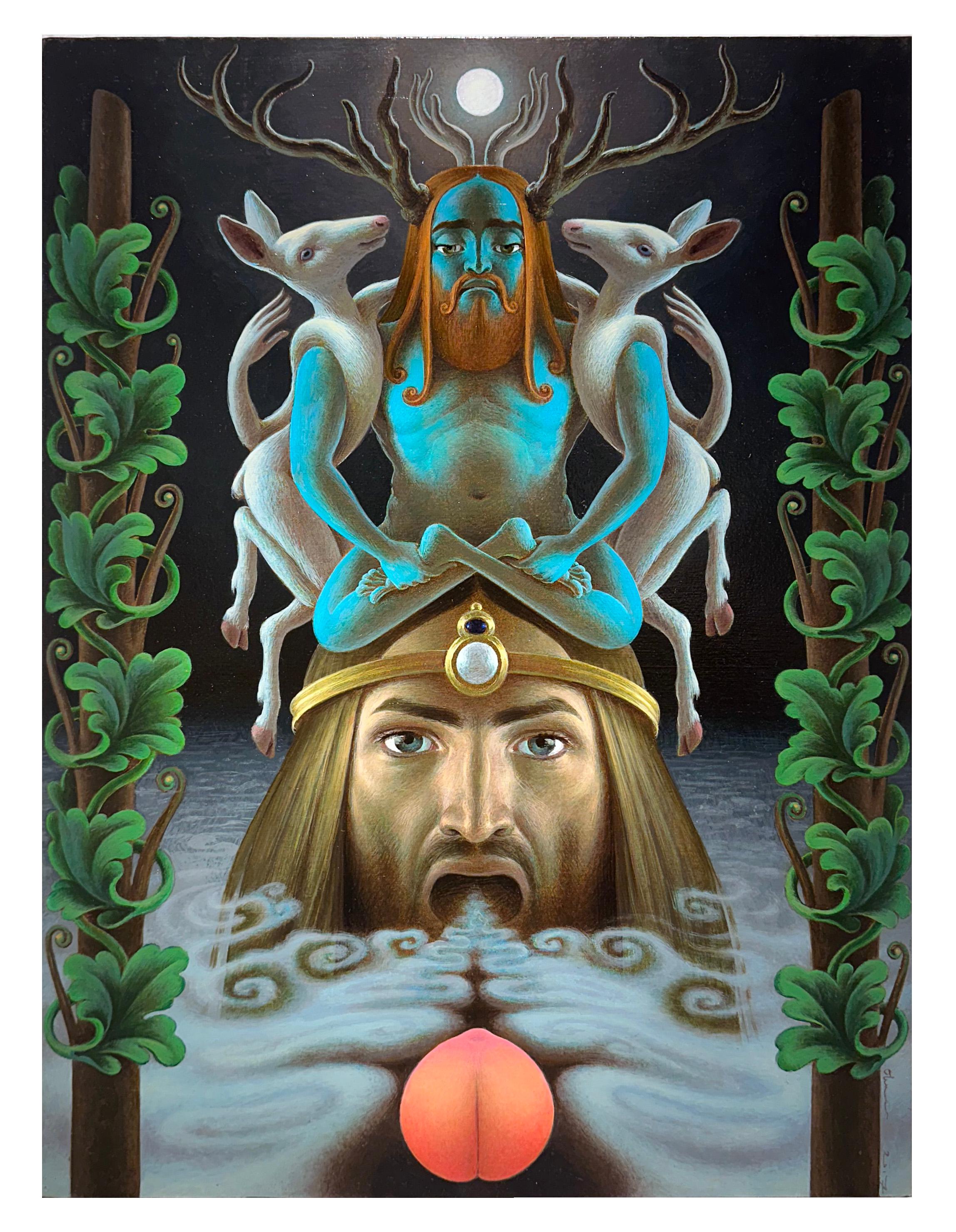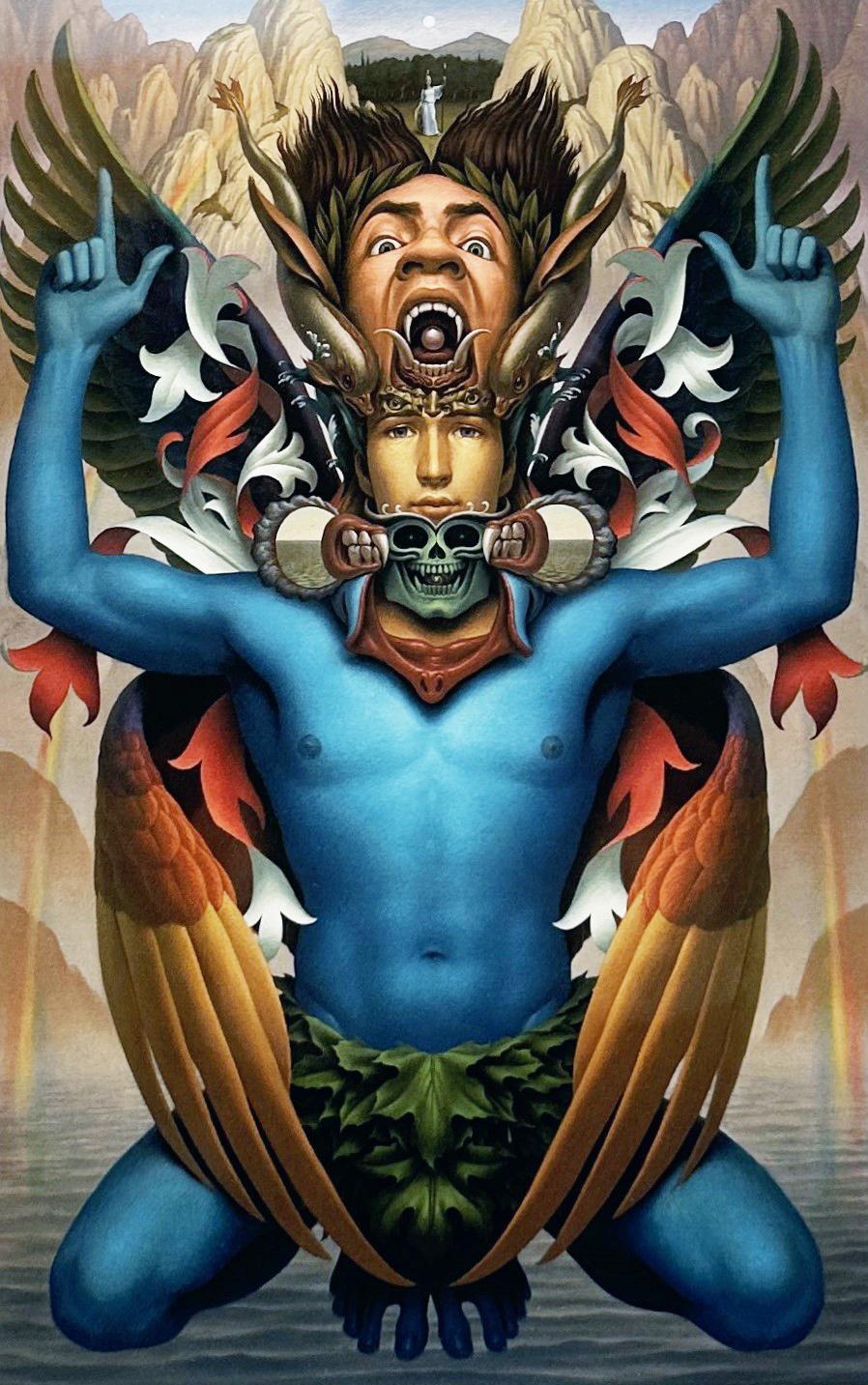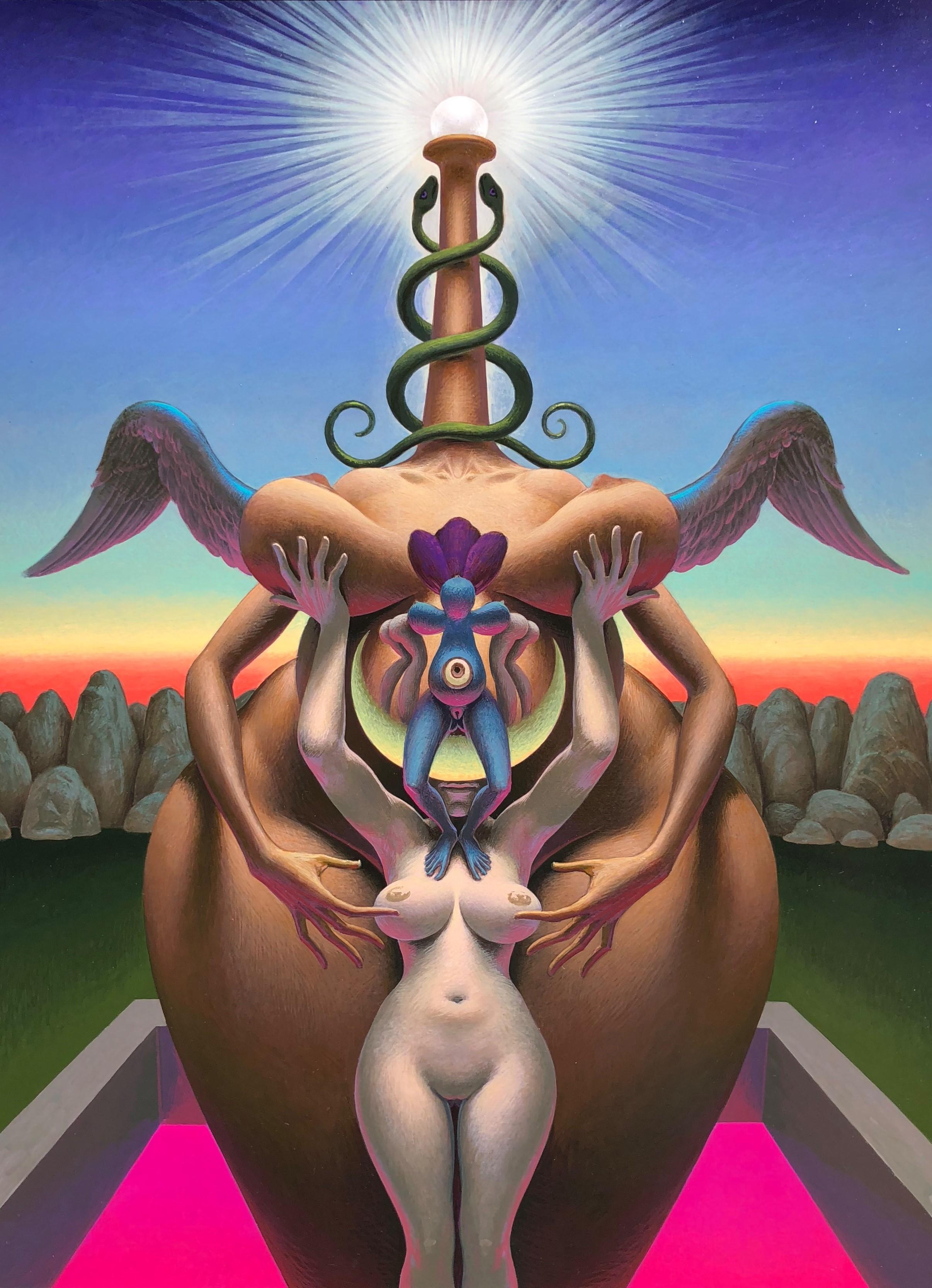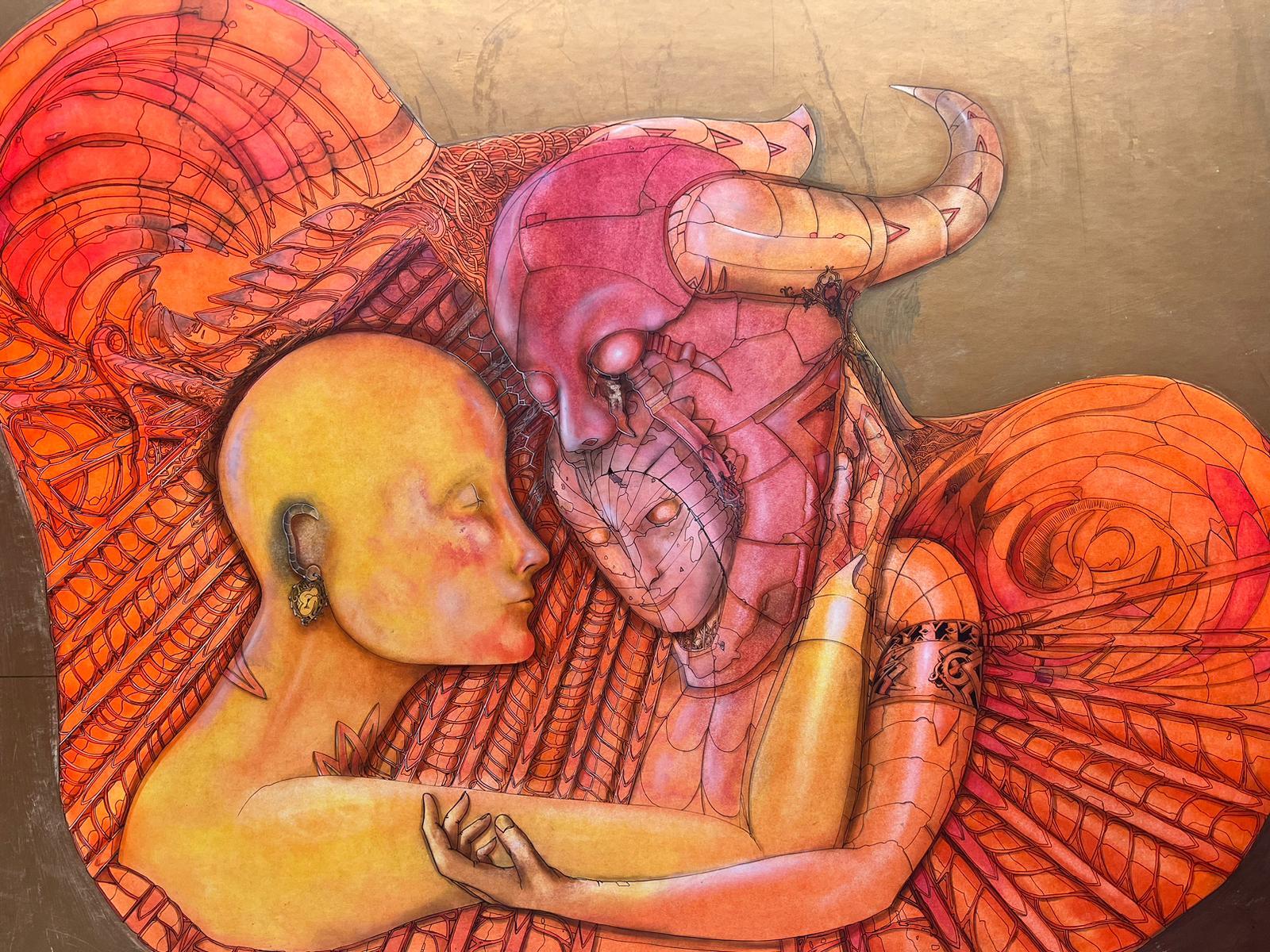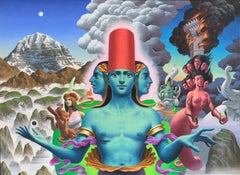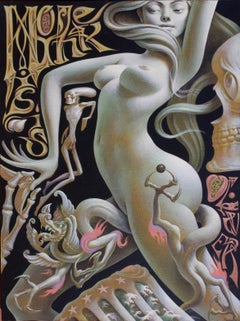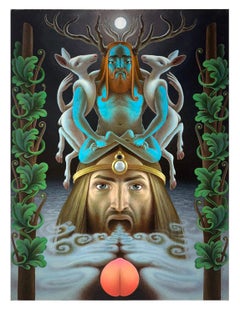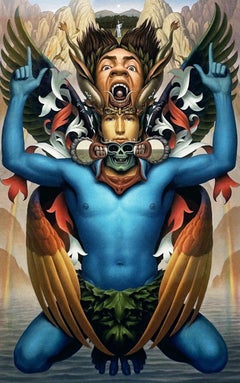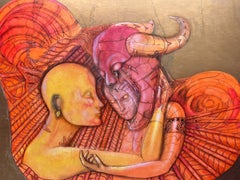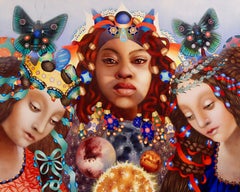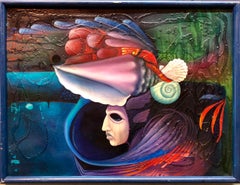Items Similar to Awakening at Gordia - Highly Detailed, Surreal and Symbolic, Acrylic on Panel
Want more images or videos?
Request additional images or videos from the seller
1 of 21
Oliver Hazard BensonAwakening at Gordia - Highly Detailed, Surreal and Symbolic, Acrylic on Panel2018
2018
$2,800
£2,138.76
€2,457.68
CA$3,997.02
A$4,382.42
CHF 2,288.46
MX$52,736.90
NOK 28,842.44
SEK 27,119.31
DKK 18,354.31
About the Item
This painting, like each of the paintings in the Purple Dawn series, is based on an earlier work that was lost or destroyed in the course of time. Feeling that I wanted to finish what I started I reconstructed the lost works from photographs and memory, adding new elements as I saw fit. For a number of reasons, I’ve assembled this series of works under the name of “Purple Dawn”.
Since the 19th century a model of physics and cosmology has developed that is separate to the now established worldview. The peculiarity of this “other” cosmology is that it is reconcilable with the bizarre stories common in mythology and the miraculous events described in religious literature. One of the recent outgrowths of this the cosmology is the notion that until recently our planet was a satellite of the planet Saturn. At the time, Saturn was a star that glowed with gentle, purple colored light. Hence “Purple Dawn”. The paintings are not intended as descriptive of a cosmology or as illustrations of any mythical or religious system. They have been created with the inner sense that there was once, and there still is a perfect state of being.—Oliver Hazard Benson
Oliver Hazard Benson
Awakening at Gordia
acrylic on panel
14h x 11w in
35.56h x 27.94w cm
Oliver Hazard’s paintings are produced directly from his imagination and deals with a mixture of imagery he has witnessed in his travels, dreams, and read about in literature. The artist is influenced by Taoism and European occultism, especially the movements of the late 19th and early 20th century. Hazard is also inspired by Surrealism and the Viennese school of Fantastic Realism imagery as well as the technique and practice of old Tibetan painting and that of Renaissance Europe. His imagery comes from his imagination within and doesn't rely on specific models whether visual, literal or otherwise cultural; but also does not avoid the appearance of recognizable figures (such as a specific god or goddess) should one of them appear.
- Creator:
- Creation Year:2018
- Dimensions:Height: 14 in (35.56 cm)Width: 11 in (27.94 cm)
- Medium:
- Movement & Style:
- Period:
- Condition:
- Gallery Location:Chicago, IL
- Reference Number:Seller: OB00911stDibs: LU55433035713
About the Seller
5.0
Platinum Seller
Premium sellers with a 4.7+ rating and 24-hour response times
Established in 2017
1stDibs seller since 2017
378 sales on 1stDibs
Typical response time: 2 hours
- ShippingRetrieving quote...Shipping from: Chicago, IL
- Return Policy
Authenticity Guarantee
In the unlikely event there’s an issue with an item’s authenticity, contact us within 1 year for a full refund. DetailsMoney-Back Guarantee
If your item is not as described, is damaged in transit, or does not arrive, contact us within 7 days for a full refund. Details24-Hour Cancellation
You have a 24-hour grace period in which to reconsider your purchase, with no questions asked.Vetted Professional Sellers
Our world-class sellers must adhere to strict standards for service and quality, maintaining the integrity of our listings.Price-Match Guarantee
If you find that a seller listed the same item for a lower price elsewhere, we’ll match it.Trusted Global Delivery
Our best-in-class carrier network provides specialized shipping options worldwide, including custom delivery.More From This Seller
View AllLord of the Center - Original Artwork of Highly Detailed Symbolic, Surreal Scene
By Oliver Hazard
Located in Chicago, IL
This painting, like each of the paintings in the Purple Dawn series, is based on an earlier work that was lost or destroyed in the course of time. Feeling that I wanted to finish wha...
Category
21st Century and Contemporary Contemporary Figurative Paintings
Materials
Acrylic, Panel
Amlodi's Nightmare, - Highly Detailed Surrealist, Original Painting on Panel
By Oliver Hazard Benson
Located in Chicago, IL
This is a version of the Renaissance motif known as "Death and the Maiden". I think the motif generally was meant to condemn Voluptus (born of the...
Category
21st Century and Contemporary Contemporary Figurative Paintings
Materials
Acrylic, Panel
Mage Love Flower - Surreal Symbolism in Highly Detailed Original Painting
By Oliver Hazard Benson
Located in Chicago, IL
This painting, like each of the paintings in the Purple Dawn series, is based on an earlier work that was lost or destroyed in the course of time. Feeling that I wanted to finish wha...
Category
21st Century and Contemporary Contemporary Figurative Paintings
Materials
Acrylic, Panel
The Blue Night - Surreal Giclee Print, Artist Proof, Matted and Framed
By Oliver Hazard Benson
Located in Chicago, IL
Oliver Hazard Benson
The Blue Knight
giclee
35h x 23w in
88.90h x 58.42w cm
1/11 AP
OB0032
Oliver Hazard’s paintings are produced directly from his i...
Category
21st Century and Contemporary Contemporary Figurative Prints
Materials
Giclée
Return of the Goddess - Original Painting of Surreal, Symbolic Goddess Figure
By Oliver Hazard Benson
Located in Chicago, IL
As is generally the case with my paintings, this work proceeded from a place of unknowing. The specificity of imagery and technique belie the non-specific character of the ideas and narratives presented. The imagery is not tied to any pre-existent source (textual or other). It is not preconceived by the artist, rather it is produced spontaneously in the process of painting. That said, it seems both easy and sensible to connect the imagery in this painting to common cultural material, especially that from very ancient sources. The central figure is very much like a totemic Neolithic goddess- the sort of which seem to be among the most ancient artistic works, examples are extant from eras stretching back tens of thousands of years. A lot has been written about figures of that kind but of course no one can reasonably claim to truly understand them. Here the great goddess appears with wings and entwined serpents. Crowned also with a glowing orb she has become an emblem of a matristic hermetica. The smaller figure may be less evidently archetypical. She is a younger goddess, a daughter like Persephone to Demeter. She lifts the breasts of her mother signifying perhaps how the presence of the child evokes the nurturing qualities of the mother or how Persephone’s seasonal ascent from the underworld awakens in her mother the impulse to again give life to the world. The cluster of gynomorphic figures contained by the crescent moon at the center of the painting refer to the balanced transformations of the lunar cycle and their mysteriously harmonic physical manifestation in the vital cycles of a woman’s body. At their axis is the cycloptical abdomen of the figure enthroned on the moon. The entire totem rises from a terrestrial gateway into an open landscape. In the background megaliths obscure the horizon. They represent a first boundary in time- the beginning of history. Below is the gateway, the opening to an inner earth...
Category
21st Century and Contemporary Abstract Geometric Nude Paintings
Materials
Acrylic, Panel
Shaosing Knobst Symbolic Taoist God - "Longevity Star", Acrylic on Panel, Framed
By Oliver Hazard Benson
Located in Chicago, IL
The figure in this painting is like the popular but at the same time oddly obscure Taoist god called “Longevity Star”. Apparently he was an historical figure born bald and grey like ...
Category
21st Century and Contemporary Surrealist Figurative Paintings
Materials
Acrylic, Panel
You May Also Like
Large French Surrealist Fantasy Figures Painting Very Unusual and Decorative
Located in Cirencester, Gloucestershire
French surrealist artist, late 20th/ early 21st century
acrylic and pen painting on board, unframed
board: 29.5 x 41.5 inches
provenance: private collection, France
condition: very g...
Category
Late 20th Century Surrealist Abstract Paintings
Materials
Acrylic, Pen
$2,342 Sale Price
20% Off
TRINITY - Contemporary Figurative Painting / Realism / Allegory
By Jacob Hicks
Located in New York, NY
Original Painting by Jacob Hicks
Jacob Hicks (b. 1985, Midland, TX) completed his BFA in 2010 at Southern Methodist University and his MFA in 2012 at the New York Academy of Art. He...
Category
2010s Contemporary Figurative Paintings
Materials
Oil, Panel
Magic Realist Surrealist Latin American Naive Fantasy Painting
By German Ramon Duron Lanza
Located in Surfside, FL
Magic realist fantasy painting in the manner of Ernst Fuchs and Arik Brauer.
Naïve art is any form of visual art that is created by a person who lacks the formal education and training that a professional artist undergoes (in anatomy, art history, technique, perspective, ways of seeing). Unlike folk art, naïve art does not necessarily evince a distinct cultural context or tradition. Naïve art is recognized, and often imitated, for its childlike simplicity and frankness. Paintings of this kind typically have a flat rendering style with a rudimentary expression of perspective.
One particularly influential painter of "naïve art" was Henri Rousseau (1844–1910), a French Post-Impressionist who was discovered by Pablo Picasso.
Naïve art is often seen as outsider art that is by someone without formal (or little) training or degree. While this was true before the twentieth century, there are now academies for naïve art. Naïve art is now a fully recognized art genre, represented in art galleries worldwide.
Museums devoted to naïve art now exist in Kecskemét, Hungary; Riga, Latvia; Jaen, Spain; Rio de Janeiro, Brasil; Vicq France and Paris. "Primitive art" is another term often applied to art by those without formal training, but is historically more often applied to work from certain cultures that have been judged socially or technologically "primitive" by Western academia, such as Native American, sub saharan African or Pacific Island art (see Tribal art). This is distinguished from the self-conscious, "primitive" inspired movement primitivism. Another term related to (but not completely synonymous with) naïve art is folk art.
There also exist the terms "naïvism" and "primitivism" which are usually applied to professional painters working in the style of naïve art (like Paul Gauguin, Mikhail Larionov, Paul Klee).
At all events, naive art can be regarded as having occupied an "official" position in the annals of twentieth-century art since - at the very latest - the publication of the Der Blaue Reiter, an almanac in 1912. Wassily Kandinsky and Franz Marc, who brought out the almanac, presented 6 reproductions of paintings by le Douanier' Rousseau (Henri Rousseau), comparing them with other pictorial examples. However, most experts agree that the year that naive art was "discovered" was 1885, when the painter Paul Signac became aware of the talents of Henri Rousseau and set about organizing exhibitions of his work in a number of prestigious galleries.
The Earth Group (Grupa Zemlja) were Croatian artists, architects and intellectuals active in Zagreb from 1929 to 1935. The group included the painters Krsto Hegedušić, Edo Kovačević, Omer Mujadžić, Kamilo Ružička, Ivan Tabaković, and Oton Postružnik, the sculptors Antun Augustinčić, Frano Kršinić, and the architect Drago Ibler.
A term applied to Yugoslav (Croatian) naive painters working in or around the village of Hlebine, near the Hungarian border, from about 1930. Some of the best known naive artists are Dragan Gaži, Ivan Generalić, Josip Generalić, Krsto Hegedušić, Mijo Kovačić, Ivan Lacković-Croata, Franjo Mraz, Ivan Večenaj and Mirko Virius.
Camille Bombois (1883–1970) Ferdinand Cheval, known as 'le facteur Cheval' (1836–1924)
Henry Darger (1892–1973) L. S. Lowry (1887–1976) Grandma Moses, Anna Mary Robertson (1860–1961) Nikifor (1895–1968) Poland, Horace Pippin (1888–1946) Jon Serl (1894-1993) United States
Alfred Wallis (1855–1942) Scottie Wilson (1890–1972) Gesner Abelard (b. 1922) Jan Balet (1913–2009) Michel Delacroix (b. 1933) France Howard Finster (1916–2001) Ivan Rabuzin (1921–2008)
Spontaneous Art Museum in Brussels
Art en Marge Museum in Brussels
MADmusée in Liege
International Museum of Naive Art of Brazil in Cosme Velho, Rio de Janeiro
Gallery Jacques Ardies in São Paulo
Musée international d'art naïf de Magog in Magog
Croatian Museum of Naïve Art in Zagreb
Gallery of Croatian Naïve Art...
Category
20th Century Folk Art Figurative Paintings
Materials
Canvas, Acrylic
Lilit, Surrealism, Abstract Figurative Painting, Contemporary Art Original
Located in Granada Hills, CA
Artist: Nelson Serob Shirvanyan
Work: Original Painting, Handmade Artwork, One of a Kind
Medium: Acrylic on Cardboard
Year: 1996
Style: Surrealism
Title: Lilit
Size: 15.5" x 11" x 0.1'' inch, (39.5x28x0.2 cm),
Unframed.
Nelson Serob Shirvanyan was born in 1944 in Armenia.
In 1970, he graduated from the Sculpture Department of the Yerevan State Institute of Fine Arts. Nelson Shirvanyan is a sculptor, artist, and teacher. His artistic journey began with his graduation from the Faculty of Fine Arts at Yerevan State University. In 1975, he became a lecturer in sculpture at the University of Armenia.
In his work, Shirvanyan draws inspiration from the architecture of medieval Armenian stone...
Category
2010s Impressionist Abstract Paintings
Materials
Acrylic, Cardboard
SATOR AREPO OPERA TENET, Painting, Oil on Canvas
Located in Yardley, PA
This image is a complex allegory of inner diversity, showcasing the variety of our internal figures that constitute our identity. The dominating figure is a character wearing a mask,...
Category
2010s Surrealist Paintings
Materials
Oil
Dream #248, Painting, Acrylic on Canvas
By Leon Zernitsky
Located in Yardley, PA
The style of this painting is Surrealism. The aim was to resolve the previously contradictory conditions of dream and reality. I sought to channel the unconscious as a means to unloc...
Category
2010s Surrealist Paintings
Materials
Acrylic
